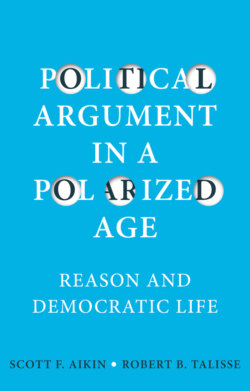Читать книгу Political Argument in a Polarized Age - Scott F. Aikin - Страница 10
Political Disagreement among Equals
ОглавлениеIn formulating this image of democracy, we have admittedly focused on it as an ideal. Our image of a society of equal citizens engaging in the activities of collective self-government is, after all, the aspiration of democracy, what democracy strives to be. We are well aware that real-world democracy falls far short of the ideal, and this book is devoted to identifying and examining some of the causes of its failures. Still, in diagnosing real-world democracy’s shortcomings, we mustn’t lose sight of the fact that, even in the ideal, democracy is a system of politics based in the premise that equal citizens are bound to disagree, sometimes profoundly, about what is good. Such disagreement is, after all, the upshot of our political equality. That’s an important thing to remember about this ideal notion of democracy – central to it, even in the ideal form, is the notion that free and equal citizens will have significant disagreements and, because they are equals, they can’t just boss each other around. And the democratic ideal is that, when no one person simply gets to call the shots for everyone else, each citizen has a duty to participate in collective self-government. This means that citizens will exercise their own judgment about the shape of collective political life, and this will naturally lead to disagreement among citizens. Accordingly, real-world political conflict, rancor, and disputation are not necessarily failures of democracy; they are exercises of democracy. Even in the ideal form, democracy is fractious.
We might say that disagreement is at the heart of democracy, both in the real world and as an ideal. Democracy is the proposal that a morally decent and socially stable collective life is possible among political equals who do not agree fully about how they should live together.
Now, disagreement in general presents problems. When we disagree with each other, we can’t get along, our plans get complicated, and sometimes even ruined. Disagreement also can escalate hostility, threaten friendships, breed contempt, and tear people apart. What’s more, where there’s disagreement there is also the acknowledgment that at least one party to the dispute must be wrong, and so, if the disagreement is pursued and resolved, someone will have to change their mind. We tend to not like changing our mind, and so earnest disagreement can prove psychologically costly. Even at is best, disagreement is risky.
Yet political disagreement – disagreement about the structure and aims of our collective life – presents an additional and distinctive problem, and it takes a little work to identify what it is. To begin, recall that political disagreements tend to have a certain depth in that they invoke conflicting judgments of value and meaning, views about what is good with respect to our collective life. Moreover, the stakes in such disagreements are frequently morally high in that the parties involved tend to see their own prevailing view as necessary for justice. Consequently, political disagreement often is engaged in among parties who see the opposition’s view as not merely flawed, inadequate, or suboptimal, but as positively wrong, possibly intolerable, and potentially disastrous. Putting these together, we can say that political disagreements are often engaged in among citizens who have a certain investment in seeing their own view prevail.
Next, remember that in a democracy, political disagreements always take place among political equals. No one simply gets to browbeat, harangue, lecture, or dictate to their fellow citizens – at least not about the political matters that face democratic decision-making. Rather, in interactions with our fellow citizens, we must manifest a due respect for their political equality. Even when we disagree with our fellow citizens about matters in which we are deeply invested, and even when we are inclined to regard our fellow citizens as invested in manifestly unacceptable alternative positions, we nonetheless must sustain our commitment to their political standing as our equals.
Maintaining this commitment often proves difficult, especially given that political disagreements frequently get heated. When we disagree over matters in which we are invested, it is all too easy to tar the opposing side with being depraved, incompetent, helplessly benighted, and incapable. When we regard others in this way, we grow to see them as something less than our political equals. They begin to appear to us as misguided underlings in need of a lesson, or, worse still, mere obstacles to be surmounted. Either way, we begin to abandon our commitment to their equality. If left unchecked, we begin to wonder why our political rivals are entitled to an equal say. In this way, although disagreement is central to the democratic ideal, it can thwart our fundamental moral commitment to the political equality of our fellow citizens. In short, democracy runs on political disagreement, but when political disagreement is poorly conducted, it can unravel democracy.
Hence the problem of political disagreement: how can we engage in real disagreement in ways that nevertheless manifest due respect for one another’s political equality? In order to address this problem, we need to devise an ethos that could govern political disagreements among citizens. To repeat, the rules of this ethos must permit real disagreement among citizens; we make no progress by simply stipulating that democratic citizens must always show deference to the majority, or decline to criticize those in power. Yet, as the function of this ethos is to preserve and manifest respect for the political equality of all citizens amidst real political disagreements, it must take the form of a moral requirement. That is, the norms governing political disagreement among democratic citizens must be such that, when someone violates them, she not only fails at appropriate engagement, she also fails at citizenship. We also can say that when a citizen exhibits a stable disposition to abide by democratic ethos in contexts of political disagreement, she thereby manifests civic virtue, the kind of virtue appropriate for a democratic citizen.
